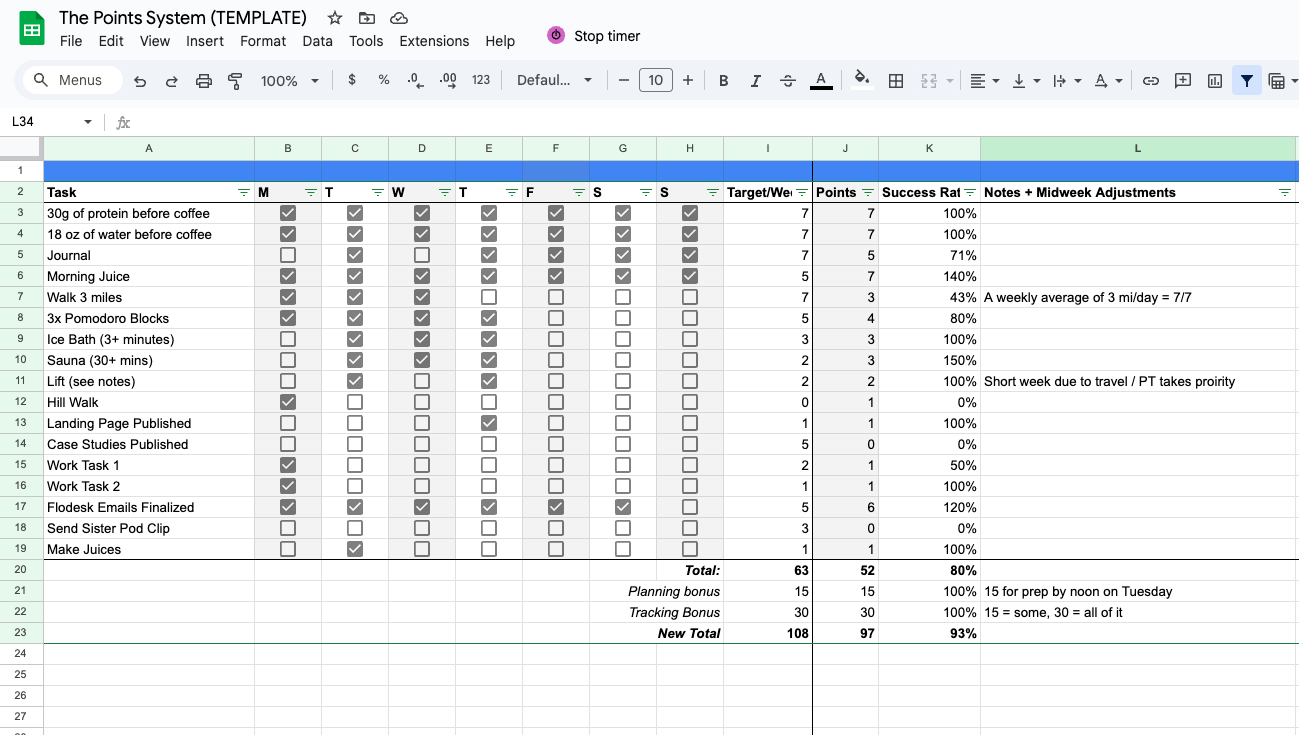The Points System (Part 2)
How to Trick Myself Into Feeling Accomplished (Because It Works)
After a few weeks of using The Points System, I’ve learned something crucial: I need proof.
Not for anyone else—for me. Because my brain has this fun little quirk: if I don’t track something, it’s like it never happened.
I could have the most productive, well-balanced week of my life, but if I didn’t measure it? My brain will tell me I did nothing. And that? That’s a problem.
So, I’ve started rewarding myself—not just for doing the tasks, but for planning, tracking (somewhat), and tracking everything. Here’s why.
Today we’re talking about the bonus points allotted in cells J21 & J22. Here’s a screenshot of my boring spreadsheet, in case you’re curious (or visual).
Why I Give Myself Points for Planning
A weird thing happens when I take the time to sit down and plan my week: I actually do the things.
Not because I’ve locked myself into a rigid schedule (we all know how that went in 2024), but because I’ve already decided what matters. I’m no longer relying on willpower to figure it out in the moment.
So now, I give myself 15 bonus points just for planning—for sitting down, reviewing what I want to get done, and adjusting my targets to fit the week.
It’s basically the productivity equivalent of laying out my gym clothes the night before, except instead of pretending I’ll wake up early to work out, I’m tricking myself into following through on things I actually want to do.
Why I Get Extra Credit
(Hint: it’s my spreadsheet)
Here’s the thing: I have a long history of all-or-nothing thinking. If I can’t do something perfectly, my brain wants to pretend it didn’t happen at all.
Tracking disrupts that. It forces me to see the full picture—not just the things I didn’t do, but the things I did.
Some days, I hit all my goals.
Some days, I get distracted by a project and forget I even had goals.
Most weeks? I land somewhere in the middle.
And that’s the point. I’m not trying to be perfect—I’m trying to be realistic.
So, if I track my week at all, I get 15 bonus points. Just for showing up and writing it down.
Because without tracking, my perception of progress is about as reliable as me saying “I’ll just check Instagram for a second.”
Why Tracking Everything Feels Like Cheating (In a Good Way)
Here’s where it gets interesting: when I fully track a week, I suddenly have proof that I’m doing more than I think.
Last week? I completed 86% of my tasks.
But because I planned my week, tracked what I did, and finished tracking it, I gave myself 30 extra points—which brought me up to a 93% success rate.
And honestly? That felt right. Not because I gamed the system (okay, maybe a little), but because I finally had a way to recognize my own effort.
This has been a big shift for me. In the past, I’d set an unreasonably high bar and then feel like I was constantly failing. Now, I have actual numbers to back up what I am doing.
And it turns out? I’m doing a lot.
And giving myself data IS the important part.
The success of this experiment largely relies on my adherence to it. So I am allocating points for participation.
It’s favoritism. And strategic. It’s favoritism strategy.
Maybe I Wasn’t Failing—Maybe I Just Had Terrible Expectations
This whole experiment has forced me to ask a bigger question:
Am I actually falling short? Or have I just been setting goals that were never realistic to begin with?
Because when I look at my numbers, the answer is obvious: I’m not failing.
I just wasn’t giving myself enough credit.
So, going forward, I’m sticking with this system—not because it’s perfect, but because it helps me see my own progress in real time. And that? That changes everything.
More on that in Part 3. But for now—if you ever feel like you’re not doing enough, maybe the problem isn’t you. Maybe you just need a better way to keep score.



